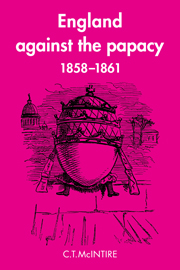 England Against the Papacy 1858–1861
England Against the Papacy 1858–1861 Book contents
- Frontmatter
- Contents
- Acknowledgments
- A note on the footnotes and abbreviations
- Maps
- Introduction
- 1 ‘English Liberties’ and ‘The Government of Priests’
- 2 Odo Russell and the network of English–papal relations
- 3 Tories, the pope, and peace
- 4 Tories, the pope, and war
- 5 Liberals and the revolution in the Romagna
- 6 Liberals, the congress and the Romagna
- 7 Liberals and the annexation of the Romagna
- 8 Liberals and the annexation of the Marches and Umbria
- Conclusion
- Select Bibliography
- Index
6 - Liberals, the congress and the Romagna
Published online by Cambridge University Press: 07 October 2011
- Frontmatter
- Contents
- Acknowledgments
- A note on the footnotes and abbreviations
- Maps
- Introduction
- 1 ‘English Liberties’ and ‘The Government of Priests’
- 2 Odo Russell and the network of English–papal relations
- 3 Tories, the pope, and peace
- 4 Tories, the pope, and war
- 5 Liberals and the revolution in the Romagna
- 6 Liberals, the congress and the Romagna
- 7 Liberals and the annexation of the Romagna
- 8 Liberals and the annexation of the Marches and Umbria
- Conclusion
- Select Bibliography
- Index
Summary
Another proposed congress and the pope
The text of the treaty of Zurich was released in mid-October and immediately the attention of the European powers turned toward a congress. The idea of a congress system, at least, was not dead. Formally, the congress agenda would have to consider the Zurich treaty. Relevant to the Papal Question, the most difficult issue would be the organization, or reorganization, of central Italy, especially of the Romagna. During the autumn of 1859 and the winter of 1859–60, questions pertaining to the congress, central Italy, and the pope were the concern of all those involved with Italian and papal affairs.
The situation in the Romagna itself was extremely inflammable. Having voted in September to overthrow the pope's authority and to seek annexation to Piedmont, it was crucial for the liberal Romagnols to move cautiously and prove to the European powers that they could keep order, run an effective government, and prevent the spread of revolution against the pope. They had to switch quickly from revolution to establishment. The English, looking on approvingly, tended to stress how tranquil and settled the civil order was there, while the papal side looked hopefully for any sign of the failure of the government of rebels.
Garibaldi and the Italian National Society threatened to upset the peace and quiet of the area, however. During October, the Italian National Society was reorganized, after its discontinuation in April, to lead the fight for annexation.
- Type
- Chapter
- Information
- England Against the Papacy 1858–1861Tories, Liberals and the Overthrow of Papal Temporal Power during the Italian Risorgimento, pp. 140 - 162Publisher: Cambridge University PressPrint publication year: 1983


